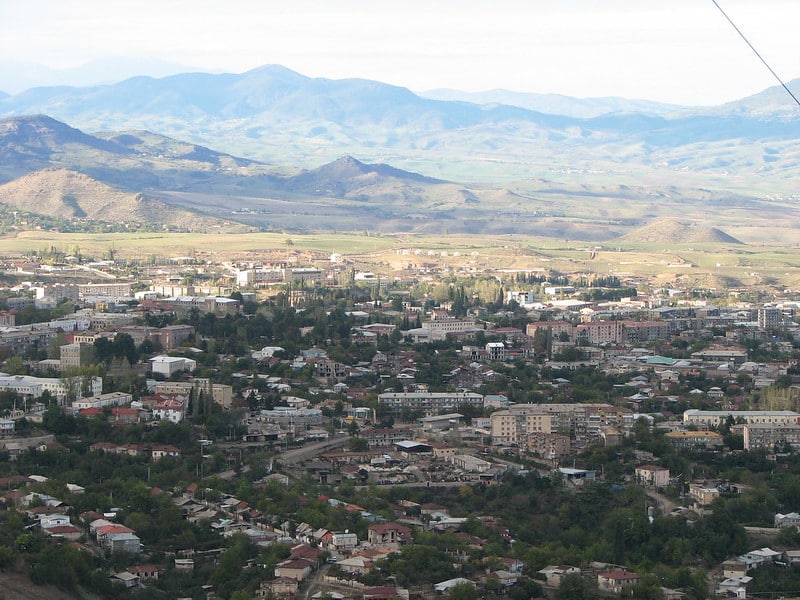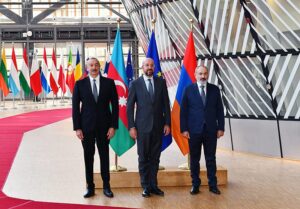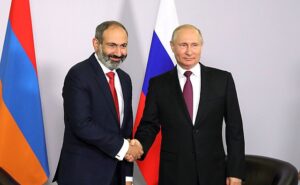Exactly one month ago Armenia and Azerbaijan signed an agreement ending a 44-day conflict over Nagorno-Karabakh. Nearly 2,800 Azerbaijani soldiers were killed during the Nagorno-Karabakh conflict and over 2,700 Armenian soldiers were killed. Azerbaijani officials released the amount of Azerbaijani casualties for the first time since the start of the conflict on December 3rd. Since signing the peace agreement, both countries have started implementing it.
Implementation of the deal
In the agreement signed on November 9th, Armenia agreed to hand over the districts it held outside Nagorno-Karabakh. These districts had been under Armenian control since the Armenia-Azerbaijani war in the 1990s, but have now been taken back by Azerbaijan. The first, Agdam, was ceded on November 20th and Kalbacar on November 25th. On December 1st, Azerbaijani army units entered the Lachin region, the last remaining district Armenia had to hand over.
The Lachin region is in between Nagorno-Karabakh and Armenia, making it a strategic stretch of land. The Lachin Corridor, a 5km-wide overland route linking Armenia with Nagorno-Karabakh, lies in the Lachin region. The Corridor is secured by 2,000 Russian peacekeepers, who have been stationed in the region since shortly after the November 9th deal was signed. The deal also calls for a transport corridor from Azerbaijan through Armenia to Naxcivan, an anclave of Azerbaijan. This corridor would also be secured by Russian peacekeepers, but it has not yet been set up.
Along with the territories outside of Nagorno-Karabakh, Azerbaijan now also controls the town of Shushi, which lies close to Nargorno-Karabakh’s capital Stepanakert. As per the peace deal, Azerbaijan held on to the areas that it took during the conflict.
Refugees returning and refugees leaving
During the conflict, An estimated 90,000 of 150,000 inhabitants of Nagorno-Karabakh fled, many of them to Armenia’s capital, Yerevan. Around a third of these refugees have returned to their homes in Nagorno-Karabakh after the violence ended. Thousands returned back to Stepanakert, Nagorno-Karabakh’s capital.
Thousands of ethnic Armenians have also fled the areas surrounding Nagorno-Karabakh that have been handed over to Azerbaijan. Feeling uncertain of their safety under Azerbaijani rule, families have been leaving the regions of Kalbacar, Agdam and Lachin. Many have been also burning their houses, so Azerbaijanis cannot move into them.
The European Commission pledged 3 million in emergency aid to civilians caught up in the conflict and Russia has pledged to send construction materials and medical equipment.
Celebrations in Azerbaijan
On December 10th, a military parade was held in Baku marking the one-month anniversary of the deal, which was attended by Turkish president Erdogan. In Azerbaijan, the peace deal was celebrated and so has the recapture of the regions surrounding Nagorno-Karabakh. President Ilham Aliyev’s office announced that November 8th, the day when Azerbaijani troops regained control over Shushi, will be marked each year as Victory Day.
When Azerbaijani forces moved into the district of Lachin, Azerbaijanis celebrated the victory in their capitol Baku. Azerbaijanis lost the district in the 1990s, and some former Azerbaijani residents of the region are now looking to return to the region, although concerns over safety and the exact location of the Lachin corridor remain.
Pashinian under pressure in Armenia
In Armenia, the peace deal has largely been seen as a defeat for the country. Armenian president Pashinian has been under increasing pressure to resign. Protests that started immediately after the signing of the deal have persisted. The latest ultimatum for Pashinian to resign was set for December 8th by 17 opposition parties. Opposition parties now call for mass civil disobedience and opposition supporters blocked streets in Yerevan immediately after the ultimatum passed. The biggest demonstration was on December 5th, when 10,000 demonstrators rallied in Yerevan.
The 17 opposition parties nominated Vazgen Manukian, a former prime minister and ex-defense minister in the 1990s, to head a “transitional, anti-crisis government” until early parliamentary elections are held. Manukian has said that Pashinian should take the chance to leave. Pashinian, on the other hand, stated he has no intention to resign. Currently, Pashinian’s My Step party still holds a wide majority in parliament which allows him to avoid a no-confidence vote.
Russia and the Minsk group
On December 2nd, Russian president Vladimir Putin called on the leaders of member states of the Collective Security Treaty Organization (CSTO) to support Pashinian. Putin stated that Pashinian “had to make painful but necessary decisions.” Russia has played a central role in the conflict, brokering the peace deal and being obliged to provide security to Armenia whilst also maintaining close relations with Azerbaijan. Now, Russia seems to be most in control of the situation. Russian peacekeepers are in Nagorno-Karabakh securing the region and not Armenia, giving Russia a lot of control over Nagorno-Karabakh.
Russia is also co-chair of the Minsk group from the OSCE, which was the long-term mediator for the conflict. France and the US, the other two co-chairs, played a notably smaller role in solving the current crisis. Azerbaijan has called for France to be removed from the Minsk Group after the French Senate backed Nagorno-Karabakh’s independence claim. Armenia lauded the French resolution, although Armenia has not officially recognized Nagorno-Karabakh’s independence either.
Turkey also had a say in the conflict, backing Azerbaijan. Recently, Turkish president Recep Tayyip Erdogan attended a victory parade in Baku on December 10th. During the conflict, Erdogan said Azerbaijan had “unconditional” support from Turkey. Although it also provided support in the form of training Azerbaijani officers and by sending over Syrian fighters, Turkey’s main influence on the conflict was through its rhetoric. After the peace deal signed with Russia, Turkey signed a memorandum with Russia to create a joint monitoring center in Azerbaijan. Russian officials have said that Turkish peacekeepers will not enter Nagorno-Karabakh and that they will remain on Azerbaijani soil.
Sources: Rferl 1, Rferl 2, Rferl 3 , Rferl 4, Rferl 5, Rferl 6, BBC, Aljazeera 1 , Politico, Aljazeera 2
Photo: Flickr



